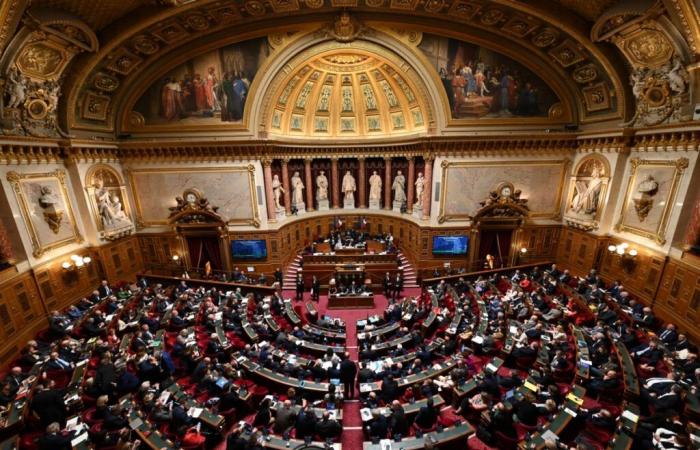The deputies rejected the revenue section of the finance bill on Tuesday, November 12, during a solemn vote, which resulted in the rejection of the entire budget. The text will therefore be transmitted in its initial version to the Senate, before probable recourse to article 49.3.
It was expected, it is now done: Tuesday, November 12, late in the afternoon, the elected officials of the Palais-Bourbon rejected the first part of the finance bill (PLF) for the year 2025. This negative vote causes the rejection of the entire state budget examined in the National Assembly. The second part, devoted to expenses, will therefore not be discussed by the deputies, for the third year in a row.
With 362 votes against and 192 for, the government coalition (Renaissance, Horizons, MoDem, Les Républicains) and far-right elected officials rejected a strongly revised budget under the leadership of the New Popular Front (NFP). Only the united left spoke out in favor of a text deemed “NFP compatible”, and endowed with “75 billion euros” in additional revenue, targeted at multinationals and large assets, according to the president of the Commission of finances, Eric Coquerel.
The text thus did not pass the first parliamentary stage and is now heading to the Senate, where it should experience a milder fate, without emerging unscathed. At the end of the debates, which will be held from November 18 until the final vote on December 12, a joint committee should be held before a probable use of article 49.3.
Four “areas of improvement” in the Senate
In the Senate, the government wants to rely on the right and center majority so that the voted budget best reflects its intentions. But this endorsement is accompanied by substantial adjustments, including four “areas of improvement”, according to the rapporteur, Senator LR Jean-François Husson. The senators thus intend to look into “the tax on electricity, the effort of local authorities, the fight against fraud, and cuts in spending”.
The most important axis concerns the tax on electricity. While Bercy wanted to free up more than 3 billion euros by raising the excise beyond its pre-crisis level, the Senate Finance Committee voted this Wednesday for an amendment which deletes this article. To compensate for this shortfall, another amendment, also voted on this Wednesday, plans to increase the gas tax by 4 euros per MWh. A path that divides, but which would generate 900 to 950 million euros in revenue, according to the rapporteur.
Another area for improvement: the effort required of local authorities, strongly criticized by local elected officials, while the highly anticipated congress of mayors is looming in a few days. This is the case of the mayor of Paris, Anne Hidalgo, who denounced a “hold-up” by the State, with an increase of 320 euros per household for Parisians. Jean-François Husson therefore proposes reducing the effort required of local authorities, which reaches at least 5 billion euros in the government project.
At the same time, the general rapporteur also proposes increasing revenue via various anti-fraud and anti-abuse measures, such as the regulation of the research tax credit (400 million), or the fight against tax fraud by tackling in particular to the practice of “CumCum” which concerns dividend arbitrage, and for which it will present a system in a future amendment.
Finally, the Senate Finance Committee also plans to tackle spending. It thus approved a cut of 200 million euros on state medical aid (AME), voted to abolish the universal national service (SNU) or even adopted an amendment to reduce the budget of teacher training. Learning aids are also in the sights, for savings of more than 750 million euros.
Overall, the proposals of the Senate Finance Committee would result in more than 4 billion euros in additional savings, indicates the rapporteur, which would make it possible to avoid deteriorating the balance planned by the government.
Joint Joint Commission, then 49.3?
After the finance bill, it is the Social Security financing bill (PLFSS) that the Senate will have to examine, as it does every year. Several provisions should change significantly, in particular the terms of the evolution of retirement pensions in 2025, or the level of company contributions on low salaries. As the deputies were unable to vote on the entire bill, it was also an initial version that was sent to the Senate.
As with the PLF, the session in the Senate should offer a second chance for certain amendments from the National Assembly which could not be examined, if they are taken up by senators. At the end of these debates, the texts will be voted on, and probably adopted by the Senate, before a joint joint commission (CMP), composed of seven deputies and seven senators, meets to make a definitive decision on the future. of the project.
In the event of continued disagreement between the two assemblies, the most likely solution will be the adoption of the text through article 49.3 of the Constitution, without the vote of parliamentarians, as announced by the Prime Minister, Michel Barnier. If necessary, the government would expose itself to a motion of censure, and potentially to a strong mobilization of the French.







